
Easy-Translate
Easy-Translate is a script for translating large text files with a SINGLE COMMAND. Easy-Translate is designed to be as easy as possible for beginners and as seamlesscustomizable and as possible for advanced users.
Stars: 177
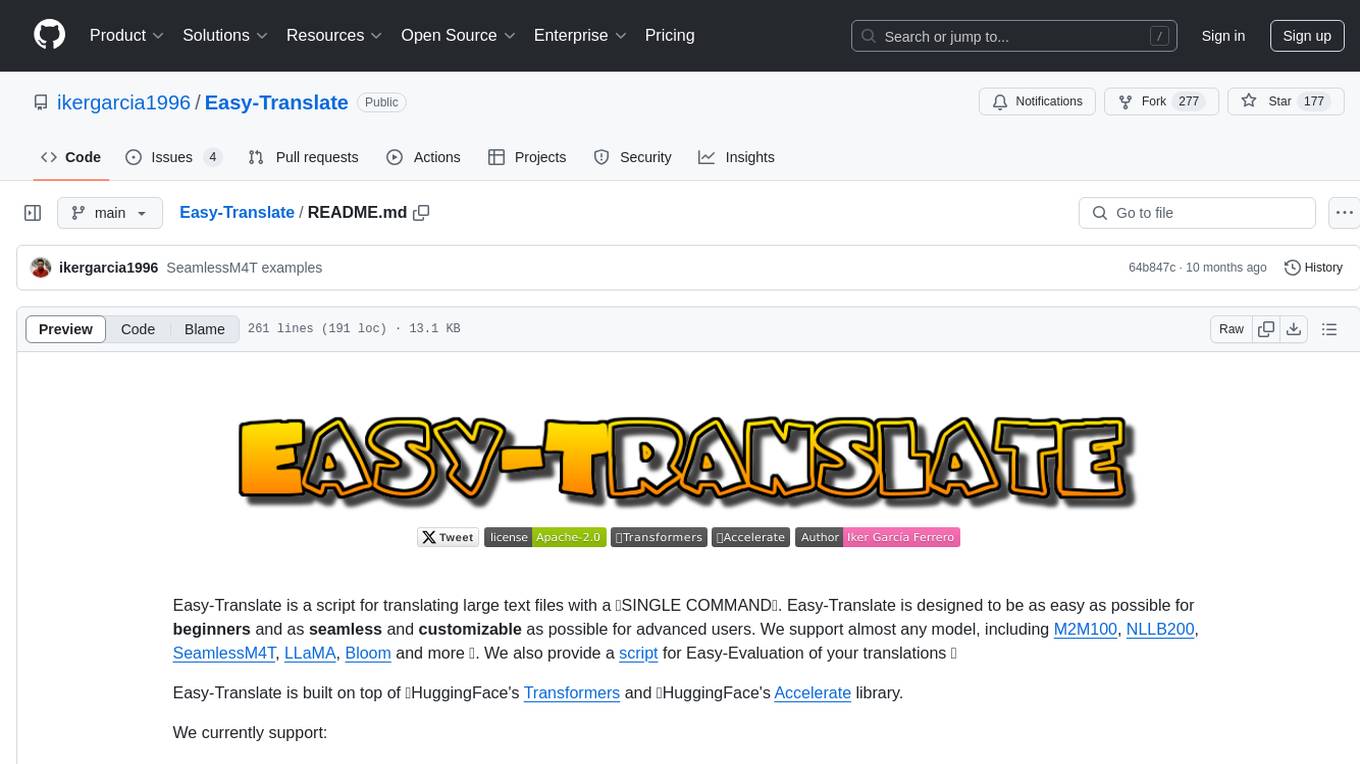
Easy-Translate is a script designed for translating large text files with a single command. It supports various models like M2M100, NLLB200, SeamlessM4T, LLaMA, and Bloom. The tool is beginner-friendly and offers seamless and customizable features for advanced users. It allows acceleration on CPU, multi-CPU, GPU, multi-GPU, and TPU, with support for different precisions and decoding strategies. Easy-Translate also provides an evaluation script for translations. Built on HuggingFace's Transformers and Accelerate library, it supports prompt usage and loading huge models efficiently.
README:
Easy-Translate is a script for translating large text files with a 💥SINGLE COMMAND💥. Easy-Translate is designed to be as easy as possible for beginners and as seamless and customizable as possible for advanced users. We support almost any model, including M2M100, NLLB200, SeamlessM4T, LLaMA, Bloom and more 🥳. We also provide a script for Easy-Evaluation of your translations 📋
Easy-Translate is built on top of 🤗HuggingFace's Transformers and 🤗HuggingFace's Accelerate library.
We currently support:
- CPU / multi-CPU / GPU / multi-GPU / TPU acceleration
- BF16 / FP16 / FP32 / 8 Bits / 4 Bits precision.
- Automatic batch size finder: Forget CUDA OOM errors. Set an initial batch size, if it doesn't fit, we will automatically adjust it.
- Multiple decoding strategies: Greedy Search, Beam Search, Top-K Sampling, Top-p (nucleus) sampling, etc. See Decoding Strategies for more information.
- Load huge models in a single GPU with 8-bits / 4-bits quantization and support for splitting the model between GPU and CPU. See Loading Huge Models for more information.
- LoRA models support
- Support for any Seq2SeqLM or CausalLM model from HuggingFace's Hub.
- Prompt support! See Prompting for more information.
- 🆕 Add support for SeamlessM4T!
Test the 🔌 Online Demo here: https://huggingface.co/spaces/Iker/Translate-100-languages
💥 EasyTranslate now supports any Seq2SeqLM (m2m100, nllb200, SeamlessM4T, small100, mbart, MarianMT, T5, FlanT5, etc.) and any CausalLM (GPT2, LLaMA, Vicuna, Falcon, etc.) model from 🤗 Hugging Face's Hub!! We still recommend you to use M2M100, NLLB200 or SeamlessM4T for the best results, but you can experiment with any other MT model, as well as prompting LLMs to generate translations (See Prompting Section for more details). You can also see the examples folder for examples of how to use EasyTranslate with different models.
M2M100 is a multilingual encoder-decoder (seq-to-seq) model trained for Many-to-Many multilingual translation introduced in this paper and first released in this repository.
M2M100 can directly translate between 9,900 directions of 100 languages.
-
Facebook/m2m100_418M: https://huggingface.co/facebook/m2m100_418M
-
Facebook/m2m100_1.2B: https://huggingface.co/facebook/m2m100_1.2B
-
Facebook/m2m100_12B: https://huggingface.co/facebook/m2m100-12B-avg-5-ckpt
No Language Left Behind (NLLB) open-sources models capable of delivering high-quality translations directly between any pair of 200+ languages — including low-resource languages like Asturian, Luganda, Urdu and more. It aims to help people communicate with anyone, anywhere, regardless of their language preferences. It was introduced in this paper and first released in this repository.
NLLB can directly translate between +40,000 of +200 languages.
-
facebook/nllb-moe-54b: https://huggingface.co/facebook/nllb-moe-54b (Requires transformers 4.28.0)
-
facebook/nllb-200-3.3B: https://huggingface.co/facebook/nllb-200-3.3B
-
facebook/nllb-200-1.3B: https://huggingface.co/facebook/nllb-200-1.3B
-
facebook/nllb-200-distilled-1.3B: https://huggingface.co/facebook/nllb-200-distilled-1.3B
-
facebook/nllb-200-distilled-600M: https://huggingface.co/facebook/nllb-200-distilled-600M
SeamlessM4T a collection of models designed to provide high quality translation, allowing people from different linguistic communities to communicate effortlessly through speech and text. It was introduced in this paper and first released in this repository.
SeamlessM4T can directly translate between 196 Languages for text input/output.
-
facebook/hf-seamless-m4t-medium: https://huggingface.co/facebook/hf-seamless-m4t-medium (Requires transformers 4.35.0)
-
facebook/hf-seamless-m4t-large: https://huggingface.co/facebook/hf-seamless-m4t-large (Requires transformers 4.35.0)
We support every MT model in the 🤗 Hugging Face's Hub. If you find a model that doesn't work, please open an issue for us to fix it or a PR with the fix. This includes, among many others:
- Small100: https://huggingface.co/alirezamsh/small100
- Mbart many-to-many / many-to-one: https://huggingface.co/facebook/mbart-large-50-many-to-many-mmt
- Opus MT: https://huggingface.co/Helsinki-NLP/opus-mt-es-en
See the Supported languages table for a table of the supported languages and their ids.
If you use this software please cite
@inproceedings{garcia-ferrero-etal-2022-model,
title = "Model and Data Transfer for Cross-Lingual Sequence Labelling in Zero-Resource Settings",
author = "Garc{\'\i}a-Ferrero, Iker and
Agerri, Rodrigo and
Rigau, German",
booktitle = "Findings of the Association for Computational Linguistics: EMNLP 2022",
month = dec,
year = "2022",
address = "Abu Dhabi, United Arab Emirates",
publisher = "Association for Computational Linguistics",
url = "https://aclanthology.org/2022.findings-emnlp.478",
pages = "6403--6416",
}
Pytorch >= 1.10.0
See: https://pytorch.org/get-started/locally/
Accelerate >= 0.12.0
pip install accelerate
HuggingFace Transformers
If you plan to use NLLB200, please use >= 4.28.0, as an important bug was fixed in this version.
If you plan to use SeamlessM4T, please use >= 4.35.0.
pip install --upgrade transformers
BitsAndBytes (Optional, required for 8-bits / 4-bits quantization)
pip install bitsandbytes
PEFT (Optional, required for loading LoRA models)
pip install peft
Run python translate.py -h for more info.
See the examples folder for examples of how to run different models.
python3 translate.py \
--sentences_path sample_text/en.txt \
--output_path sample_text/en2es.translation.m2m100_1.2B.txt \
--source_lang en \
--target_lang es \
--model_name facebook/m2m100_1.2BIf you want to translate all the files in a directory, use the --sentences_dir flag instead of --sentences_path.
# We use --files_extension txt to translate only files with this extension.
# Use empty string to translate all files in the directory
python3 translate.py \
--sentences_dir sample_text/ \
--output_path sample_text/translations \
--files_extension txt \
--source_lang en \
--target_lang es \
--model_name facebook/m2m100_1.2BSee Accelerate documentation for more information (multi-node, TPU, Sharded model...): https://huggingface.co/docs/accelerate/index
You can use the Accelerate CLI to configure the Accelerate environment (Run accelerate config in your terminal) instead of using the --multi_gpu and --num_processes flags.
# Use 2 GPUs
accelerate launch --multi_gpu --num_processes 2 --num_machines 1 translate.py \
--sentences_path sample_text/en.txt \
--output_path sample_text/en2es.translation.m2m100_1.2B.txt \
--source_lang en \
--target_lang es \
--model_name facebook/m2m100_1.2BWe will automatically find a batch size that fits in your GPU memory. The default initial batch size is 128 (You can set it with the --starting_batch_size 128 flag). If we find an Out Of Memory error, we will automatically decrease the batch size until we find a working one.
Huge models such as LLaMA 65B or nllb-moe-54b can be loaded in a single GPU with 8 bits and 4 bits quantification with minimal performance degradation.
See BitsAndBytes. Set precision to 8 or 4 with the --precision flag.
pip install bitsandbytes
python3 translate.py \
--sentences_path sample_text/en.txt \
--output_path sample_text/en2es.translation.nllb200-moe-54B.txt \
--source_lang eng_Latn \
--target_lang spa_Latn \
--model_name facebook/nllb-moe-54b \
--precision 8 \
--force_auto_device_map \
--starting_batch_size 8If even the quantified model does not fit in your GPU memory, you can set the --force_auto_device_map flag.
The model will be split across GPUs and CPU to fit it in memory. CPU offloading is slow, but will allow you to run huge models that do not fit in your GPU memory.
You can use LLMs such as LLaMA, Vicuna, GPT2, FlanT5, etc, instead of a translation model. These models require
a prompt to define the task. You can either have the prompt already in the input file (each sentence includes the prompt)
or you can use the --prompt flag to add the prompt to each sentence. In this case, you need to include the token %%SENTENCE%% in the prompt.
This token will be replaced by the sentence to translate. You do not need to specify the --source_lang and --target_lang flags in this case.
python3 translate.py \
--sentences_path sample_text/en.txt \
--output_path sample_text/en2es.FlanT5.translation.txt \
--model_name google/flan-t5-large \
--prompt "Translate English to Spanish: %%SENTENCE%%" You can choose the decoding/sampling strategy to use and the number of candidate translations to output for each input sentence.
By default, we will use beam-search with num_beams set to 5, and we will output the most likely candidate translation. This should be the best
configuration for most use cases. You can change this behaviour with the following flags:
--num_beams: Number of beams to use for beam-search decoding (default: 5)
--do_sample: Whether to use sampling instead of beam-search decoding (default: False)
--temperature: Sampling temperature (default: 0.8)
--top_k: Top k sampling (default: 100)
--top_p: Top p sampling (default: 0.75)
--repetition_penalty: Repetition penalty (default: 1.0)
--keep_special_tokens: Whether to keep special tokens (default: False)
--keep_tokenization_spaces: Whether to keep tokenization spaces (default: False)
--num_return_sequences: Number of candidate translations to output for each input sentence (default: 1)Please, note that running --do_sample with --num_beams > 1 and 8 bits or 4 bits quantification may be numerically unstable and produce an error.
To run the evaluation script you need to install bert_score: pip install bert_score and 🤗HuggingFace's Evaluate model: pip install evaluate.
The evaluation script will calculate the following metrics:
Run the following command to evaluate the translations:
python3 eval.py \
--pred_path sample_text/en2es.translation.m2m100_1.2B.txt \
--gold_path sample_text/es.txt If you want to save the results to a file use the --output_path flag.
See sample_text/en2es.m2m100_1.2B.json for a sample output.
For Tasks:
Click tags to check more tools for each tasksFor Jobs:
Alternative AI tools for Easy-Translate
Similar Open Source Tools

Easy-Translate
Easy-Translate is a script designed for translating large text files with a single command. It supports various models like M2M100, NLLB200, SeamlessM4T, LLaMA, and Bloom. The tool is beginner-friendly and offers seamless and customizable features for advanced users. It allows acceleration on CPU, multi-CPU, GPU, multi-GPU, and TPU, with support for different precisions and decoding strategies. Easy-Translate also provides an evaluation script for translations. Built on HuggingFace's Transformers and Accelerate library, it supports prompt usage and loading huge models efficiently.
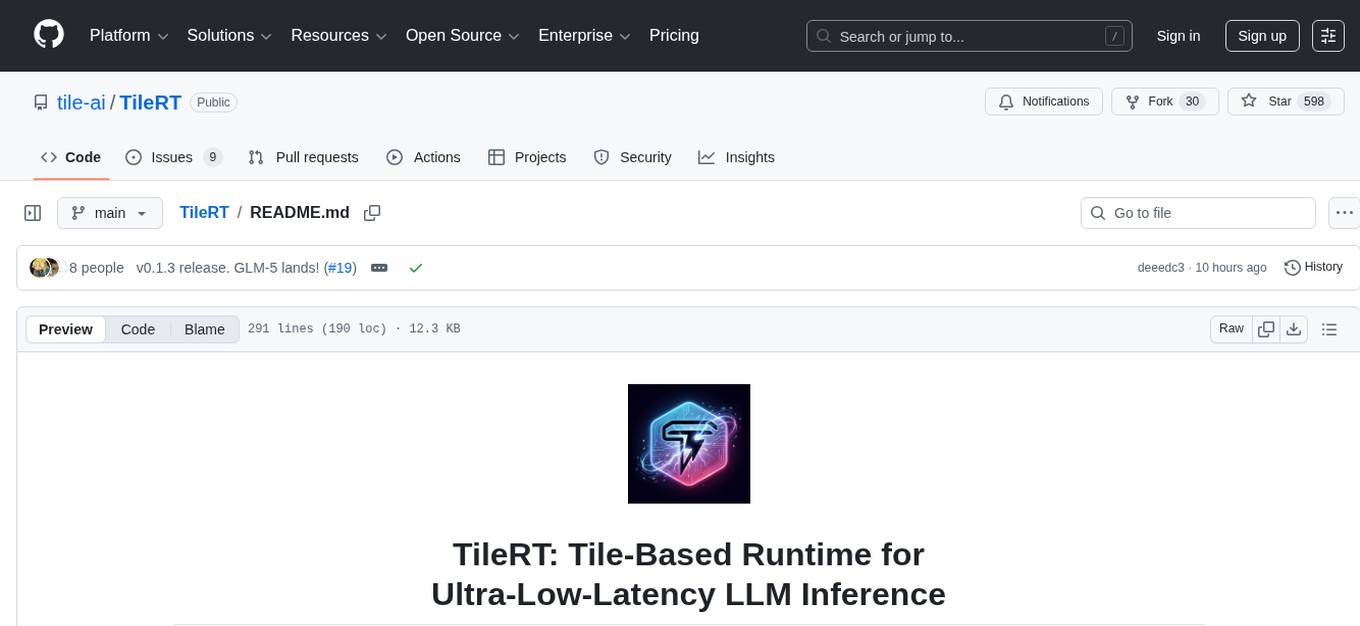
TileRT
TileRT is a project designed to serve large language models (LLMs) in ultra-low-latency scenarios. It aims to push the latency limits of LLMs without compromising model size or quality, enabling models with hundreds of billions of parameters to achieve millisecond-level time per output token. TileRT prioritizes responsiveness for applications like high-frequency trading, interactive AI, real-time decision-making, long-running agents, and AI-assisted coding. It introduces a tile-level runtime engine that dynamically reschedules computation, I/O, and communication across multiple devices to minimize idle time and improve hardware utilization. The project is actively evolving, with compiler techniques gradually shared with the community through TileLang and TileScale.
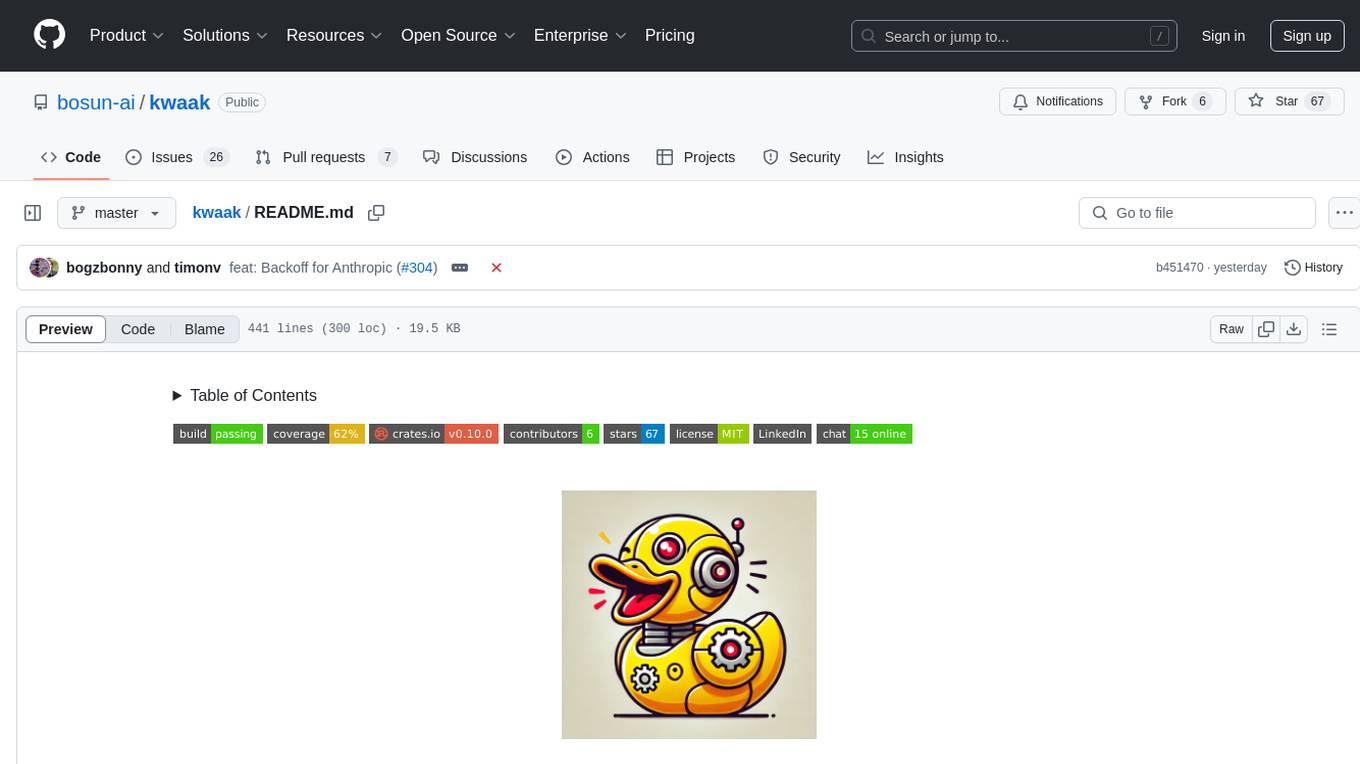
kwaak
Kwaak is a tool that allows users to run a team of autonomous AI agents locally from their own machine. It enables users to write code, improve test coverage, update documentation, and enhance code quality while focusing on building innovative projects. Kwaak is designed to run multiple agents in parallel, interact with codebases, answer questions about code, find examples, write and execute code, create pull requests, and more. It is free and open-source, allowing users to bring their own API keys or models via Ollama. Kwaak is part of the bosun.ai project, aiming to be a platform for autonomous code improvement.
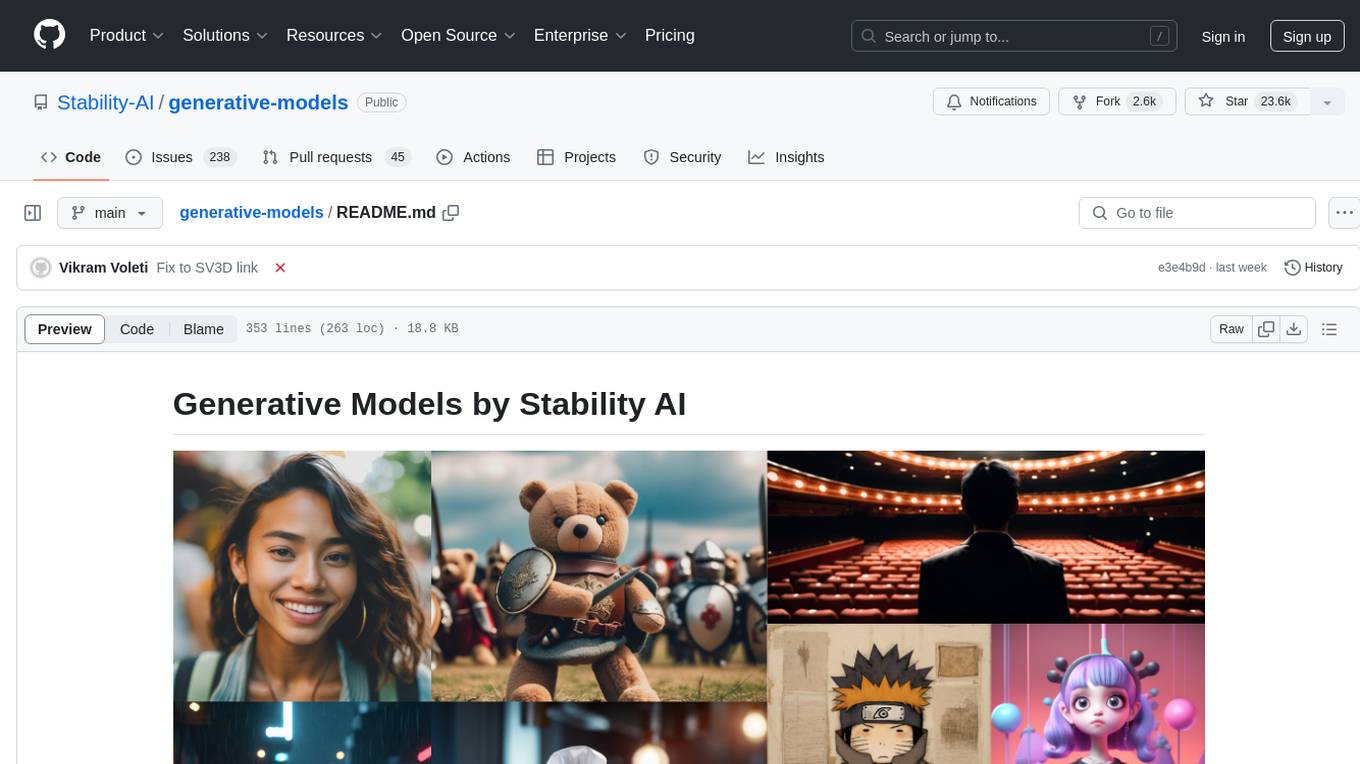
generative-models
Generative Models by Stability AI is a repository that provides various generative models for research purposes. It includes models like Stable Video 4D (SV4D) for video synthesis, Stable Video 3D (SV3D) for multi-view synthesis, SDXL-Turbo for text-to-image generation, and more. The repository focuses on modularity and implements a config-driven approach for building and combining submodules. It supports training with PyTorch Lightning and offers inference demos for different models. Users can access pre-trained models like SDXL-base-1.0 and SDXL-refiner-1.0 under a CreativeML Open RAIL++-M license. The codebase also includes tools for invisible watermark detection in generated images.
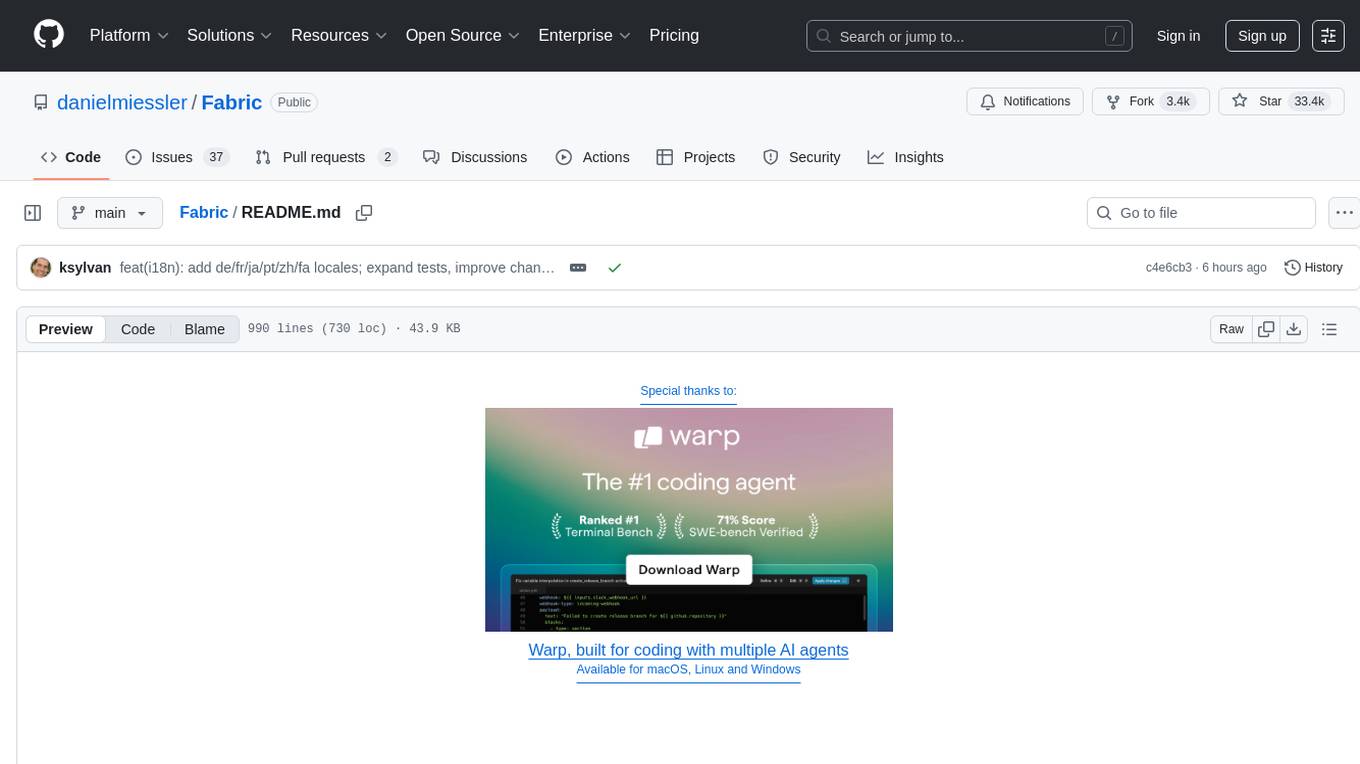
Fabric
Fabric is an open-source framework designed to augment humans using AI by organizing prompts by real-world tasks. It addresses the integration problem of AI by creating and organizing prompts for various tasks. Users can create, collect, and organize AI solutions in a single place for use in their favorite tools. Fabric also serves as a command-line interface for those focused on the terminal. It offers a wide range of features and capabilities, including support for multiple AI providers, internationalization, speech-to-text, AI reasoning, model management, web search, text-to-speech, desktop notifications, and more. The project aims to help humans flourish by leveraging AI technology to solve human problems and enhance creativity.
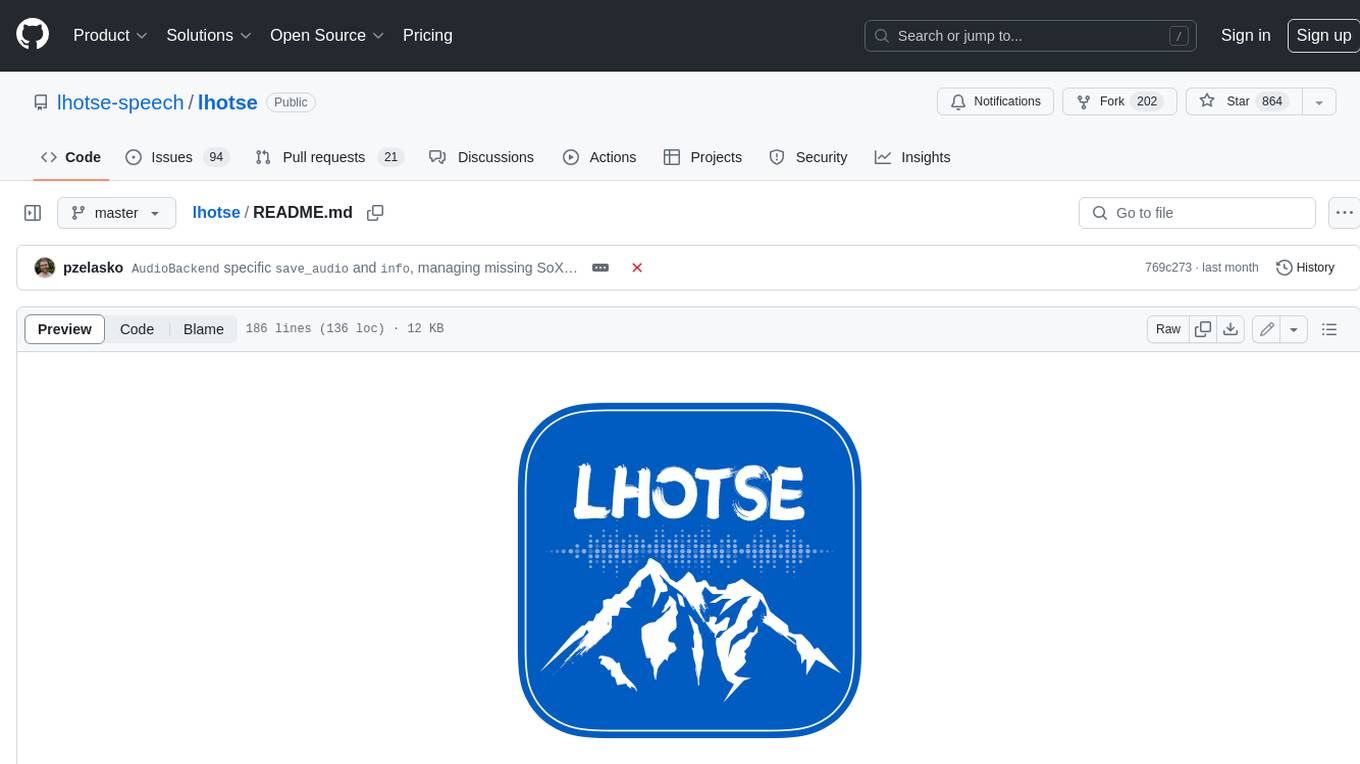
lhotse
Lhotse is a Python library designed to make speech and audio data preparation flexible and accessible. It aims to attract a wider community to speech processing tasks by providing a Python-centric design and an expressive command-line interface. Lhotse offers standard data preparation recipes, PyTorch Dataset classes for speech tasks, and efficient data preparation for model training with audio cuts. It supports data augmentation, feature extraction, and feature-space cut mixing. The tool extends Kaldi's data preparation recipes with seamless PyTorch integration, human-readable text manifests, and convenient Python classes.
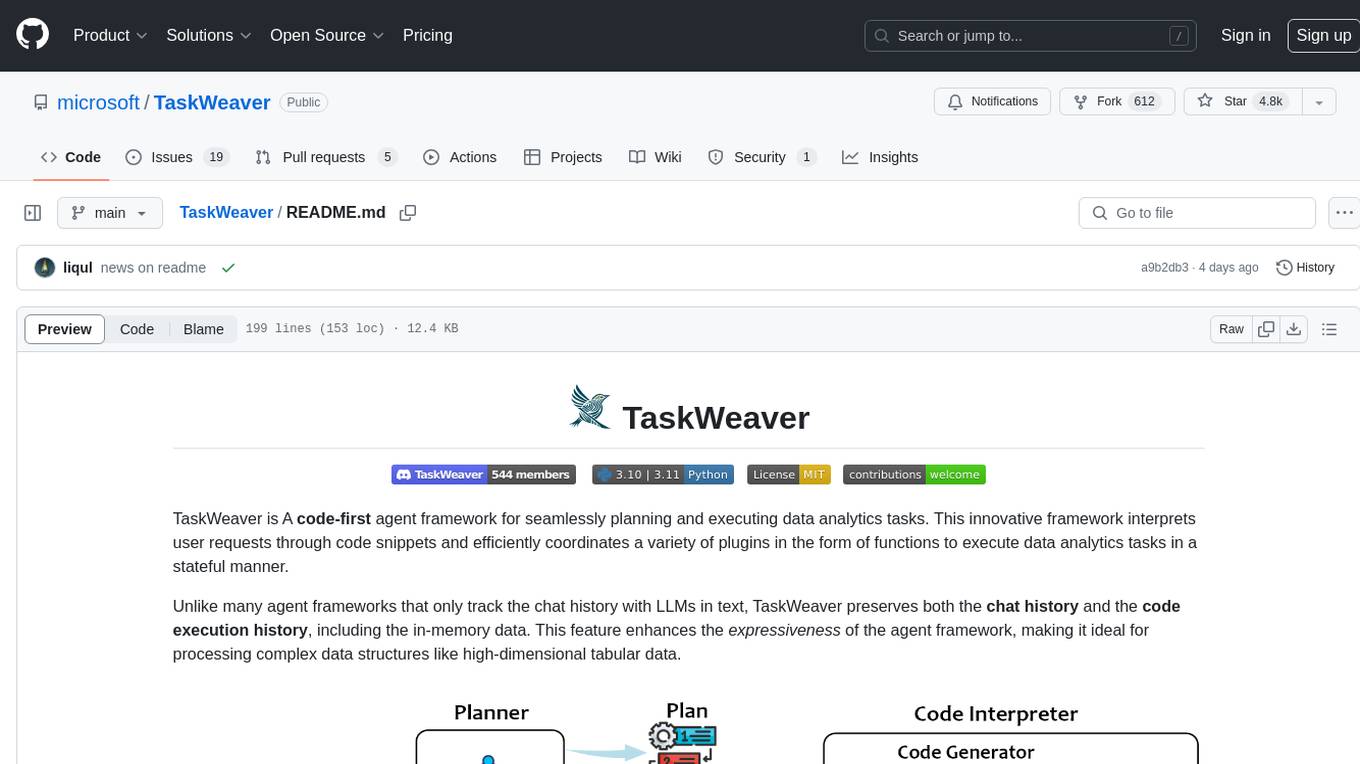
TaskWeaver
TaskWeaver is a code-first agent framework designed for planning and executing data analytics tasks. It interprets user requests through code snippets, coordinates various plugins to execute tasks in a stateful manner, and preserves both chat history and code execution history. It supports rich data structures, customized algorithms, domain-specific knowledge incorporation, stateful execution, code verification, easy debugging, security considerations, and easy extension. TaskWeaver is easy to use with CLI and WebUI support, and it can be integrated as a library. It offers detailed documentation, demo examples, and citation guidelines.

deep-research
Deep Research is a lightning-fast tool that uses powerful AI models to generate comprehensive research reports in just a few minutes. It leverages advanced 'Thinking' and 'Task' models, combined with an internet connection, to provide fast and insightful analysis on various topics. The tool ensures privacy by processing and storing all data locally. It supports multi-platform deployment, offers support for various large language models, web search functionality, knowledge graph generation, research history preservation, local and server API support, PWA technology, multi-key payload support, multi-language support, and is built with modern technologies like Next.js and Shadcn UI. Deep Research is open-source under the MIT License.
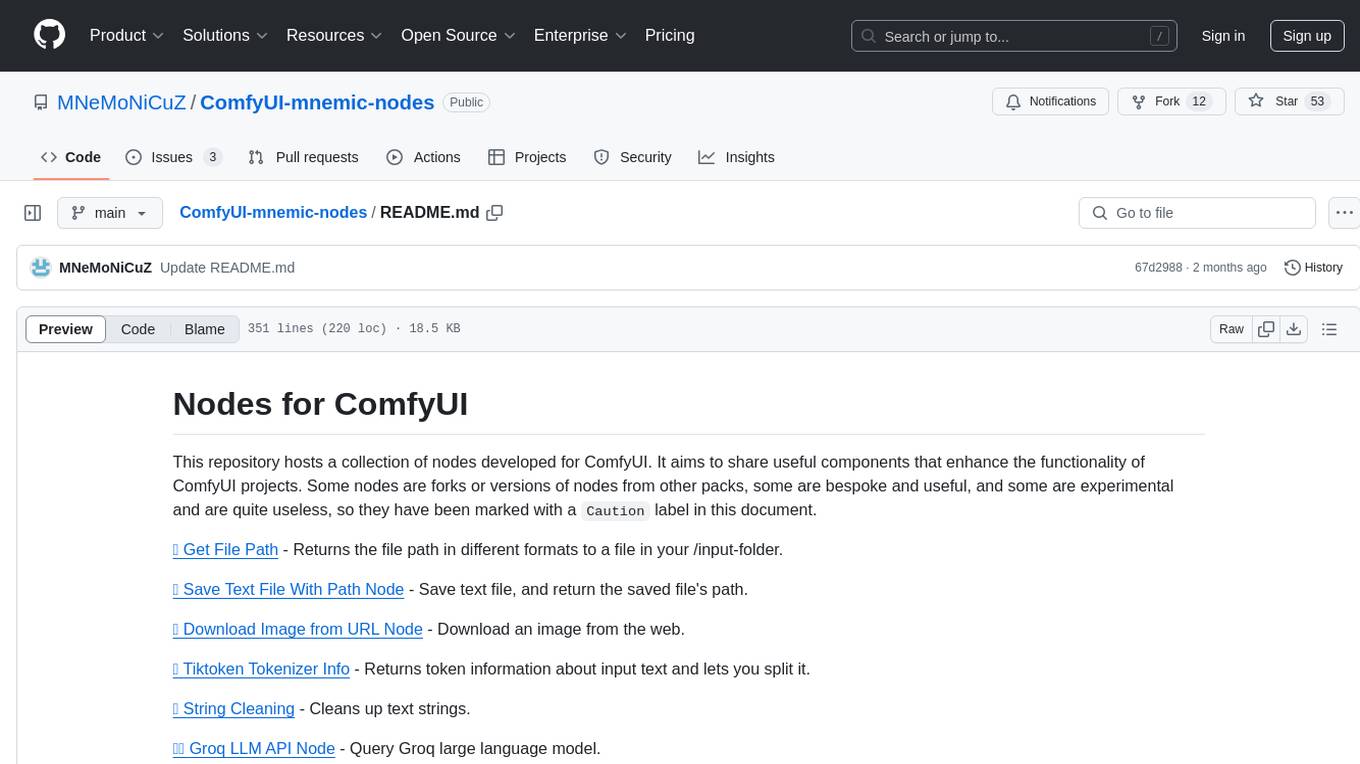
ComfyUI-mnemic-nodes
ComfyUI-mnemic-nodes is a repository hosting a collection of nodes developed for ComfyUI, providing useful components to enhance project functionality. The nodes include features like returning file paths, saving text files, downloading images from URLs, tokenizing text, cleaning strings, querying Groq language models, generating negative prompts, and more. Some nodes are experimental and marked with a 'Caution' label. Installation instructions and setup details are provided for each node, along with examples and presets for different tasks.
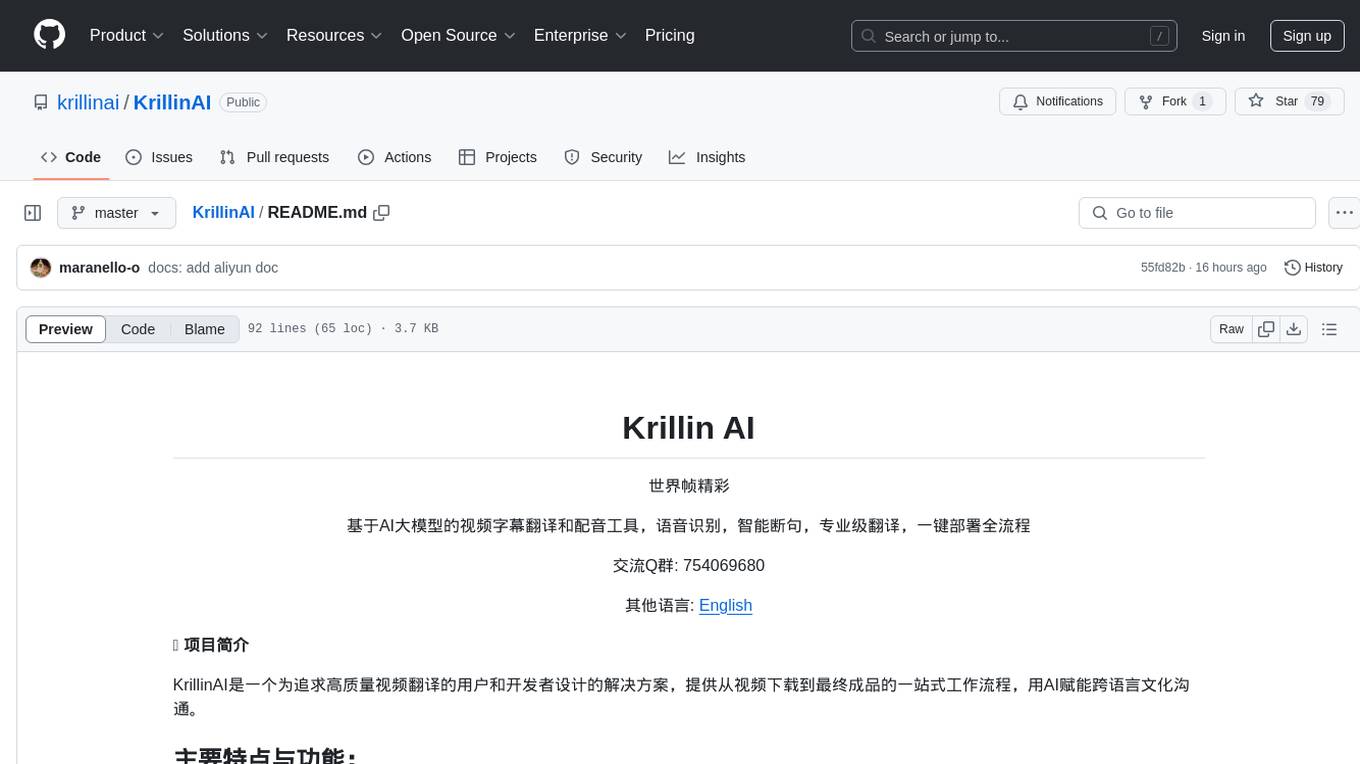
KrillinAI
KrillinAI is a video subtitle translation and dubbing tool based on AI large models, featuring speech recognition, intelligent sentence segmentation, professional translation, and one-click deployment of the entire process. It provides a one-stop workflow from video downloading to the final product, empowering cross-language cultural communication with AI. The tool supports multiple languages for input and translation, integrates features like automatic dependency installation, video downloading from platforms like YouTube and Bilibili, high-speed subtitle recognition, intelligent subtitle segmentation and alignment, custom vocabulary replacement, professional-level translation engine, and diverse external service selection for speech and large model services.

OpenAdapt
OpenAdapt is an open-source software adapter between Large Multimodal Models (LMMs) and traditional desktop and web Graphical User Interfaces (GUIs). It aims to automate repetitive GUI workflows by leveraging the power of LMMs. OpenAdapt records user input and screenshots, converts them into tokenized format, and generates synthetic input via transformer model completions. It also analyzes recordings to generate task trees and replay synthetic input to complete tasks. OpenAdapt is model agnostic and generates prompts automatically by learning from human demonstration, ensuring that agents are grounded in existing processes and mitigating hallucinations. It works with all types of desktop GUIs, including virtualized and web, and is open source under the MIT license.
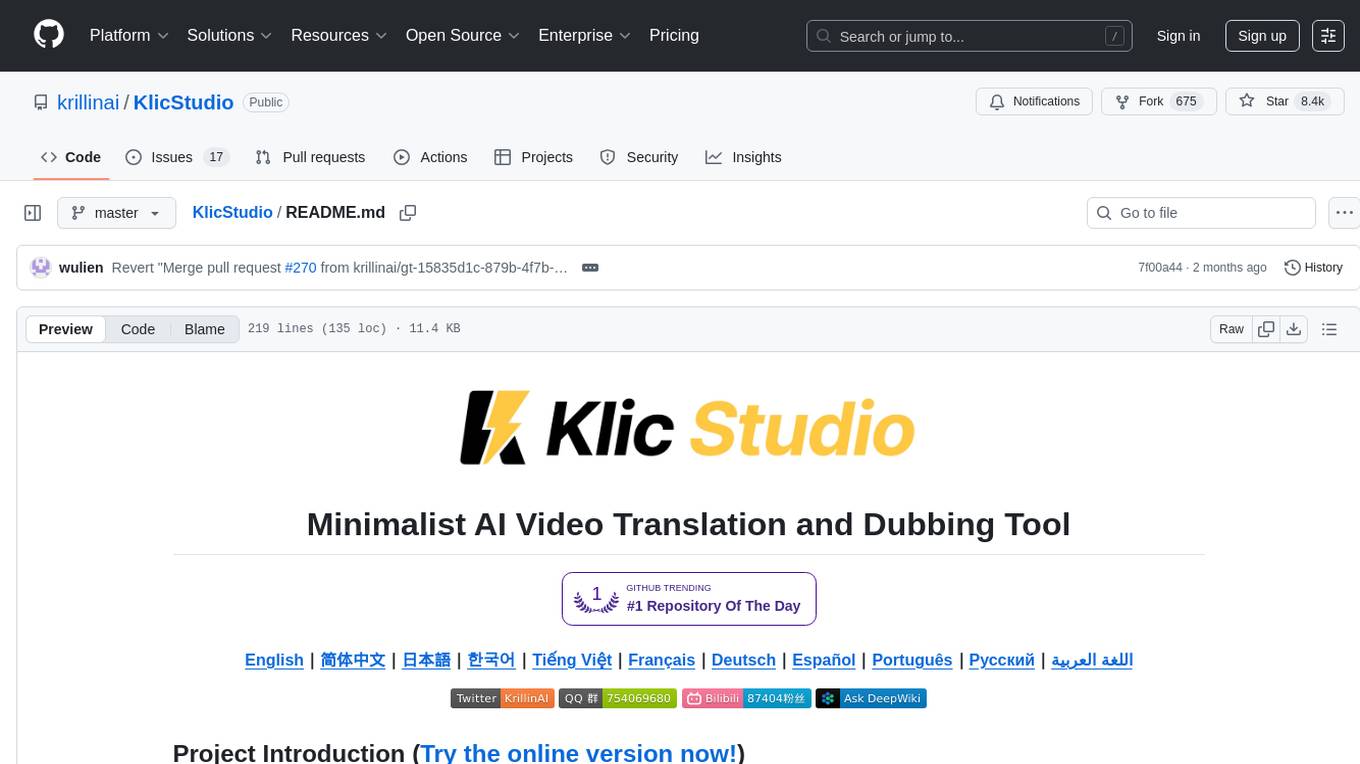
KlicStudio
Klic Studio is a versatile audio and video localization and enhancement solution developed by Krillin AI. This minimalist yet powerful tool integrates video translation, dubbing, and voice cloning, supporting both landscape and portrait formats. With an end-to-end workflow, users can transform raw materials into beautifully ready-to-use cross-platform content with just a few clicks. The tool offers features like video acquisition, accurate speech recognition, intelligent segmentation, terminology replacement, professional translation, voice cloning, video composition, and cross-platform support. It also supports various speech recognition services, large language models, and TTS text-to-speech services. Users can easily deploy the tool using Docker and configure it for different tasks like subtitle translation, large model translation, and optional voice services.
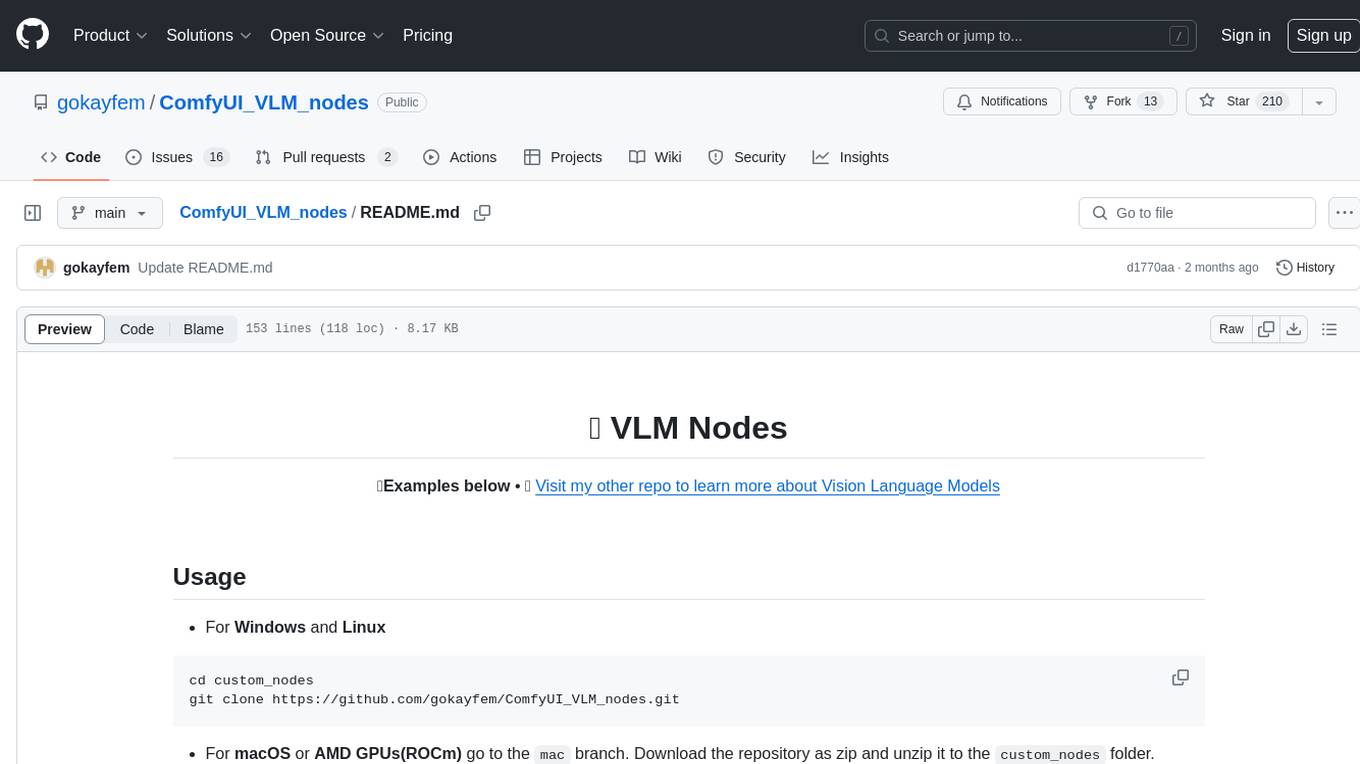
ComfyUI_VLM_nodes
ComfyUI_VLM_nodes is a repository containing various nodes for utilizing Vision Language Models (VLMs) and Language Models (LLMs). The repository provides nodes for tasks such as structured output generation, image to music conversion, LLM prompt generation, automatic prompt generation, and more. Users can integrate different models like InternLM-XComposer2-VL, UForm-Gen2, Kosmos-2, moondream1, moondream2, JoyTag, and Chat Musician. The nodes support features like extracting keywords, generating prompts, suggesting prompts, and obtaining structured outputs. The repository includes examples and instructions for using the nodes effectively.
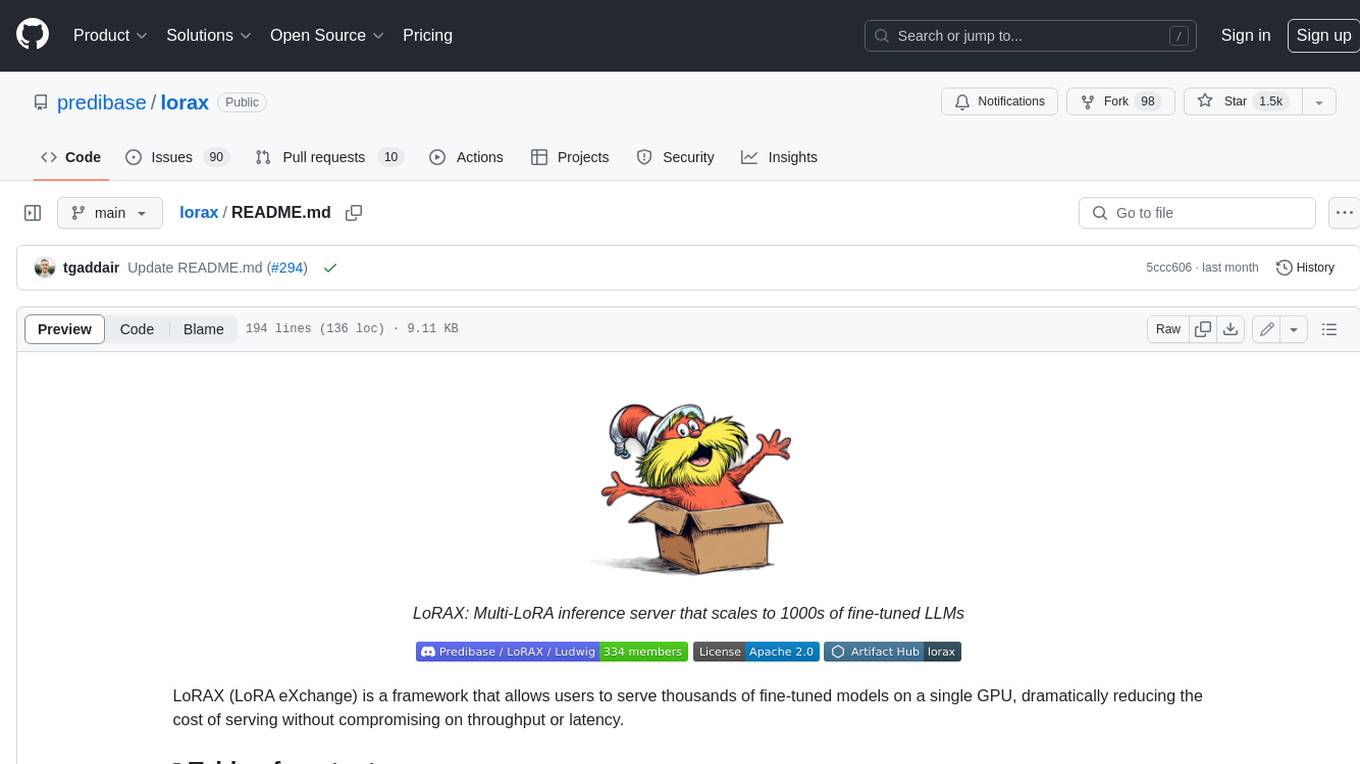
lorax
LoRAX is a framework that allows users to serve thousands of fine-tuned models on a single GPU, dramatically reducing the cost of serving without compromising on throughput or latency. It features dynamic adapter loading, heterogeneous continuous batching, adapter exchange scheduling, optimized inference, and is ready for production with prebuilt Docker images, Helm charts for Kubernetes, Prometheus metrics, and distributed tracing with Open Telemetry. LoRAX supports a number of Large Language Models as the base model including Llama, Mistral, and Qwen, and any of the linear layers in the model can be adapted via LoRA and loaded in LoRAX.
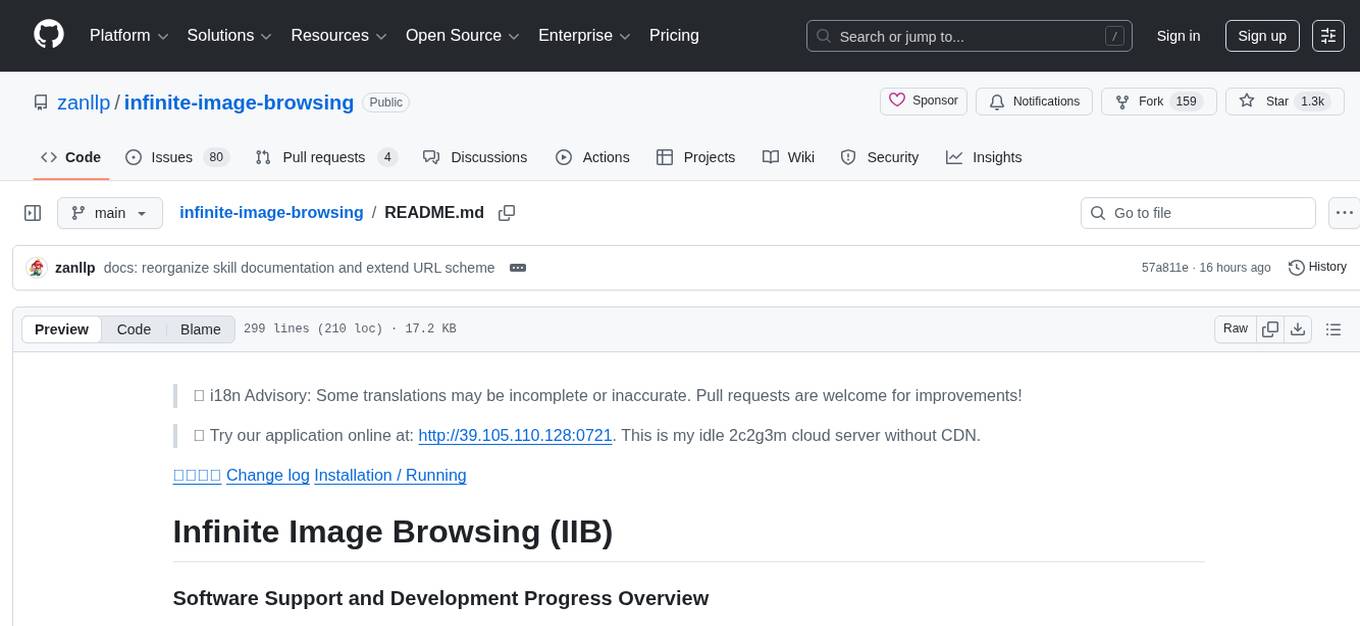
infinite-image-browsing
Infinite Image Browsing (IIB) is a versatile tool that offers excellent performance in displaying images, supports image search and favorite functionalities, allows viewing images/videos with various features like full-screen preview and sending to other tabs, provides multiple usage methods including extension installation, standalone Python usage, and desktop application, supports TikTok-style view, walk mode for automatic loading of folders, preview based on file tree structure, image comparison, topic/tag analysis, smart file organization, multilingual support, privacy and security features, packaging/batch download, keyboard shortcuts, and AI integration. The tool also offers natural language categorization and search capabilities, with API endpoints for embedding, clustering, and prompt retrieval. It supports caching and incremental updates for efficient processing and offers various configuration options through environment variables.
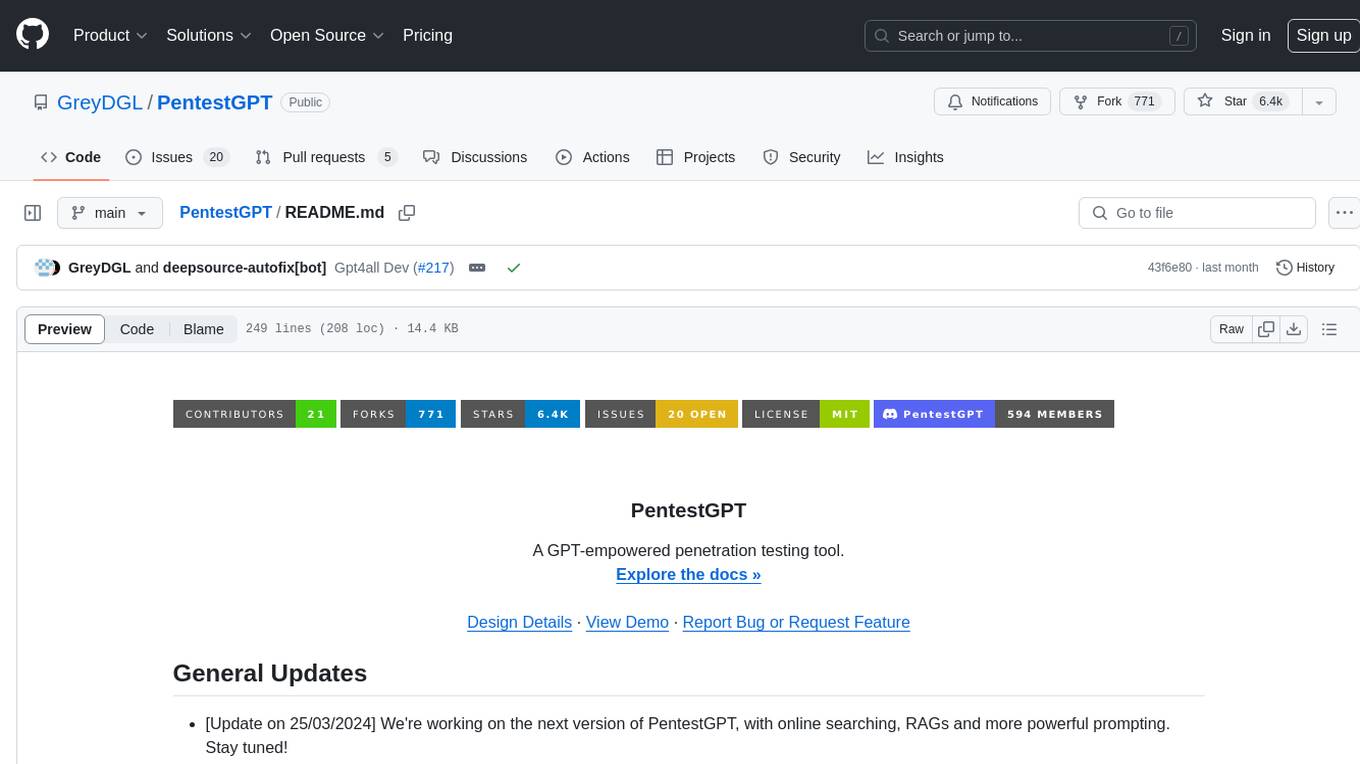
PentestGPT
PentestGPT is a penetration testing tool empowered by ChatGPT, designed to automate the penetration testing process. It operates interactively to guide penetration testers in overall progress and specific operations. The tool supports solving easy to medium HackTheBox machines and other CTF challenges. Users can use PentestGPT to perform tasks like testing connections, using different reasoning models, discussing with the tool, searching on Google, and generating reports. It also supports local LLMs with custom parsers for advanced users.
For similar tasks

Easy-Translate
Easy-Translate is a script designed for translating large text files with a single command. It supports various models like M2M100, NLLB200, SeamlessM4T, LLaMA, and Bloom. The tool is beginner-friendly and offers seamless and customizable features for advanced users. It allows acceleration on CPU, multi-CPU, GPU, multi-GPU, and TPU, with support for different precisions and decoding strategies. Easy-Translate also provides an evaluation script for translations. Built on HuggingFace's Transformers and Accelerate library, it supports prompt usage and loading huge models efficiently.
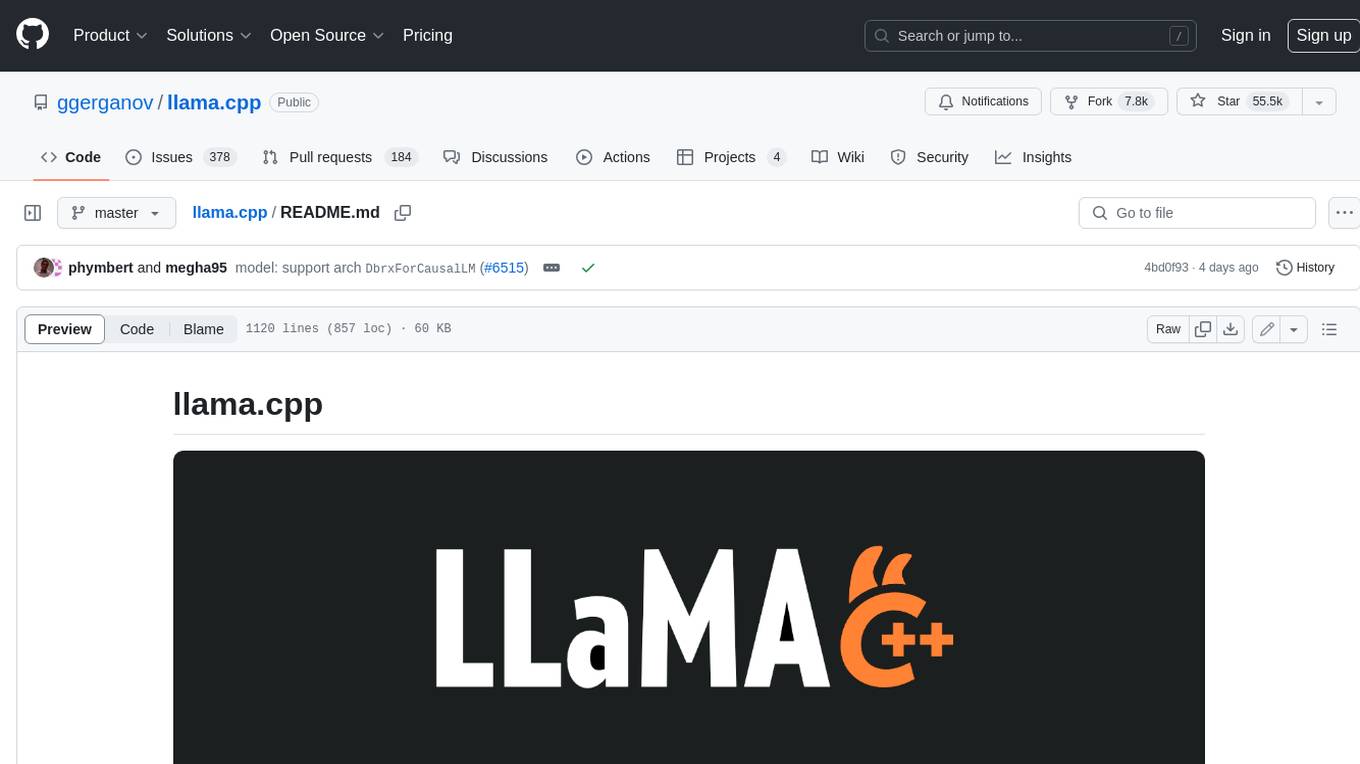
llama.cpp
llama.cpp is a C++ implementation of LLaMA, a large language model from Meta. It provides a command-line interface for inference and can be used for a variety of tasks, including text generation, translation, and question answering. llama.cpp is highly optimized for performance and can be run on a variety of hardware, including CPUs, GPUs, and TPUs.
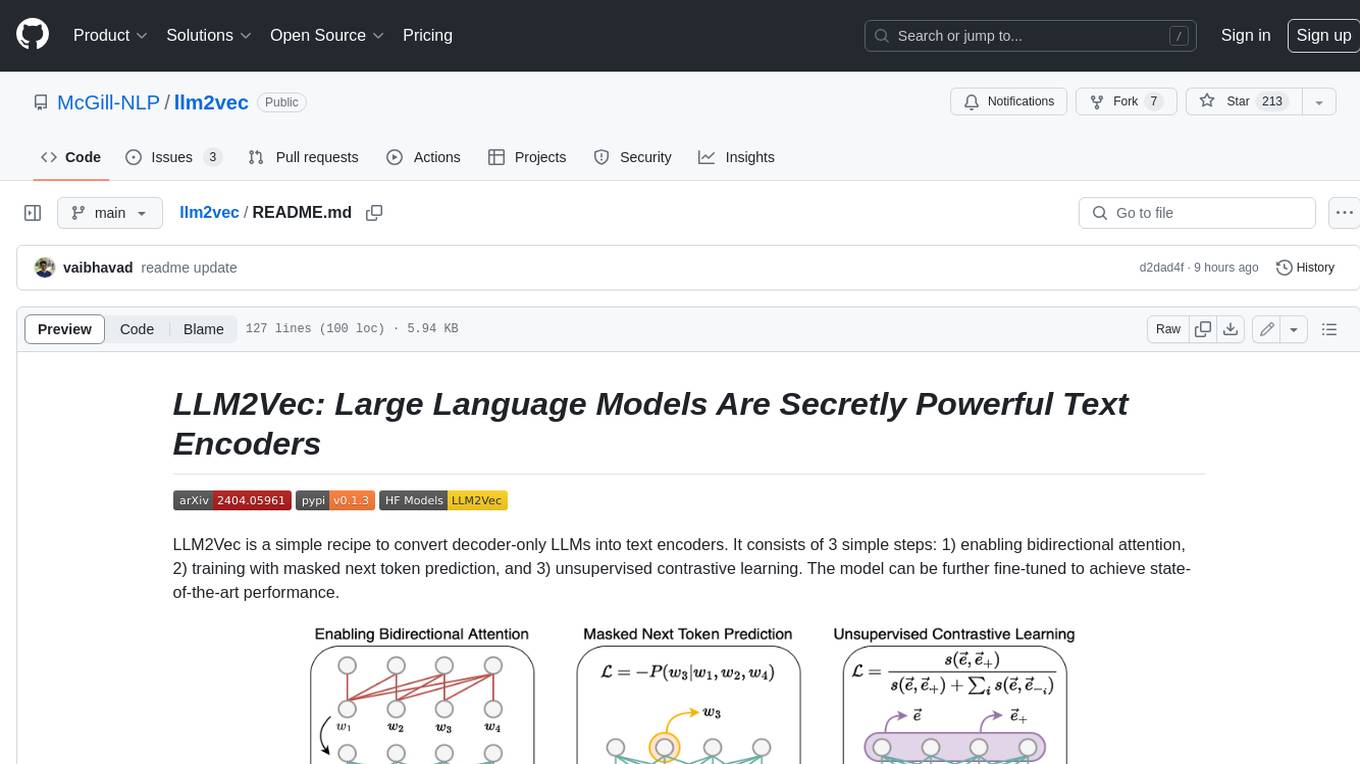
llm2vec
LLM2Vec is a simple recipe to convert decoder-only LLMs into text encoders. It consists of 3 simple steps: 1) enabling bidirectional attention, 2) training with masked next token prediction, and 3) unsupervised contrastive learning. The model can be further fine-tuned to achieve state-of-the-art performance.
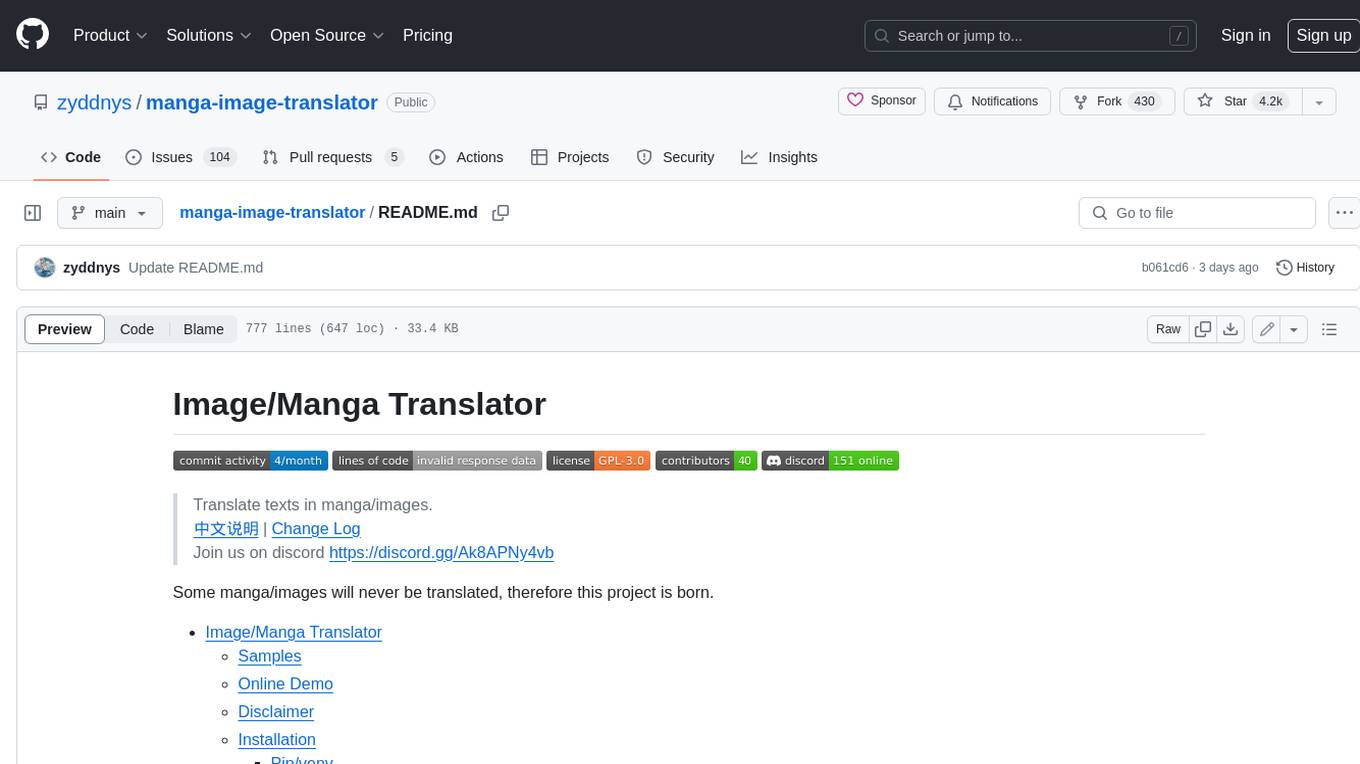
manga-image-translator
Translate texts in manga/images. Some manga/images will never be translated, therefore this project is born. * Image/Manga Translator * Samples * Online Demo * Disclaimer * Installation * Pip/venv * Poetry * Additional instructions for **Windows** * Docker * Hosting the web server * Using as CLI * Setting Translation Secrets * Using with Nvidia GPU * Building locally * Usage * Batch mode (default) * Demo mode * Web Mode * Api Mode * Related Projects * Docs * Recommended Modules * Tips to improve translation quality * Options * Language Code Reference * Translators Reference * GPT Config Reference * Using Gimp for rendering * Api Documentation * Synchronous mode * Asynchronous mode * Manual translation * Next steps * Support Us * Thanks To All Our Contributors :
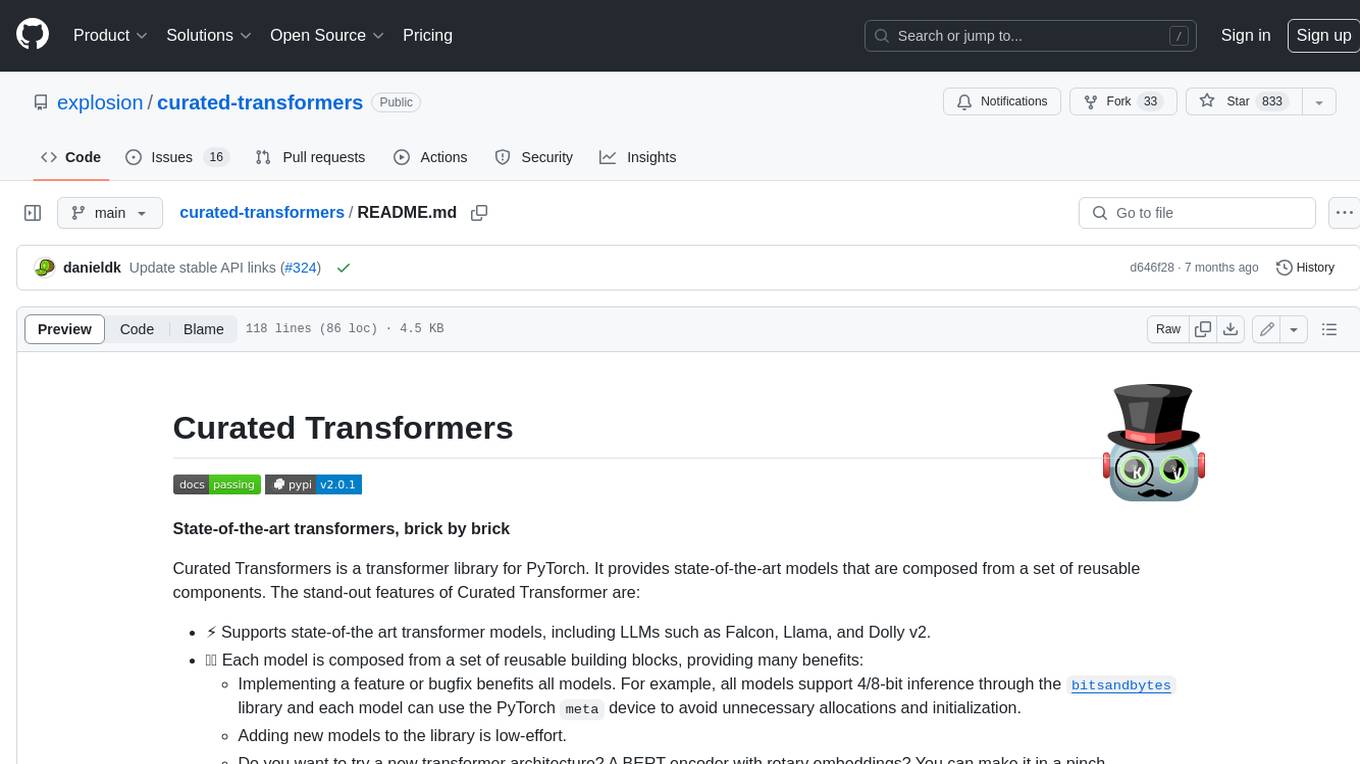
curated-transformers
Curated Transformers is a transformer library for PyTorch that provides state-of-the-art models composed of reusable components. It supports various transformer architectures, including encoders like ALBERT, BERT, and RoBERTa, and decoders like Falcon, Llama, and MPT. The library emphasizes consistent type annotations, minimal dependencies, and ease of use for education and research. It has been production-tested by Explosion and will be the default transformer implementation in spaCy 3.7.
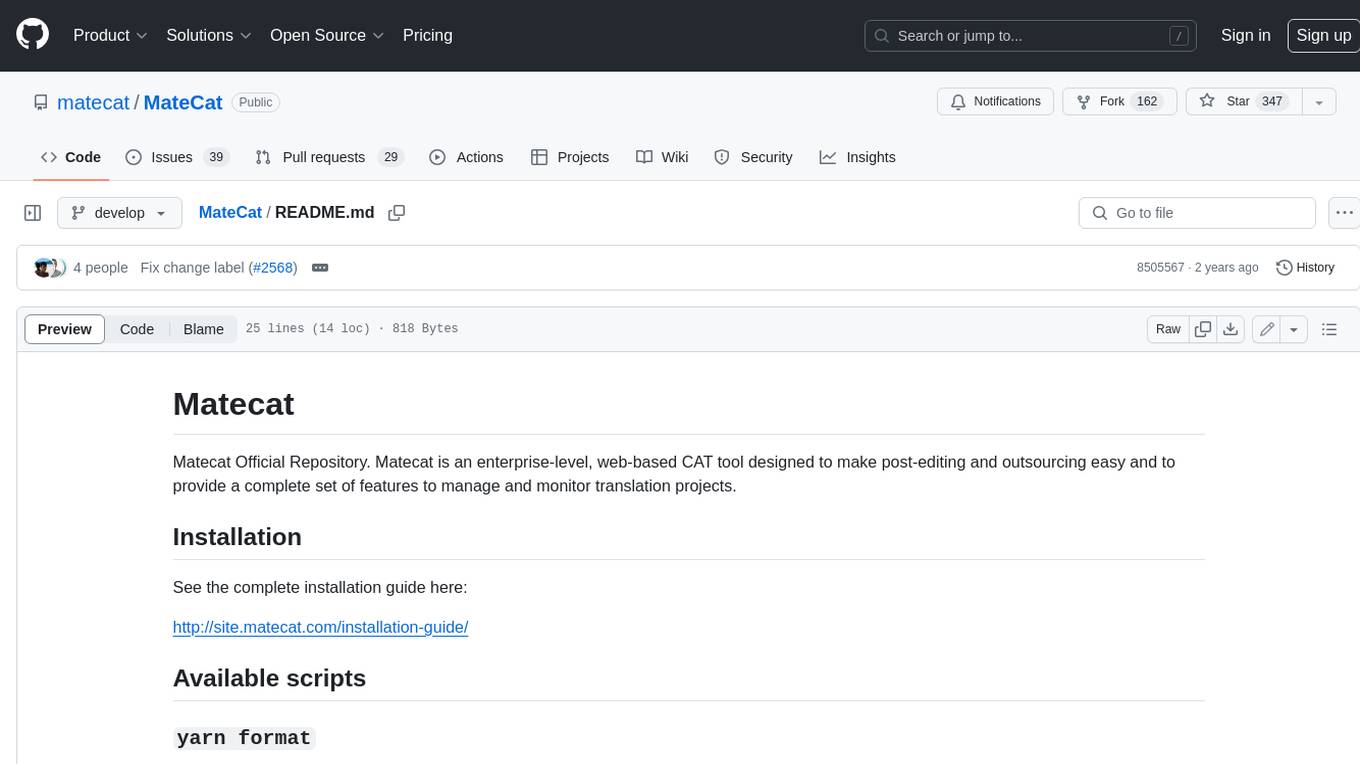
MateCat
Matecat is an enterprise-level, web-based CAT tool designed to make post-editing and outsourcing easy and to provide a complete set of features to manage and monitor translation projects.
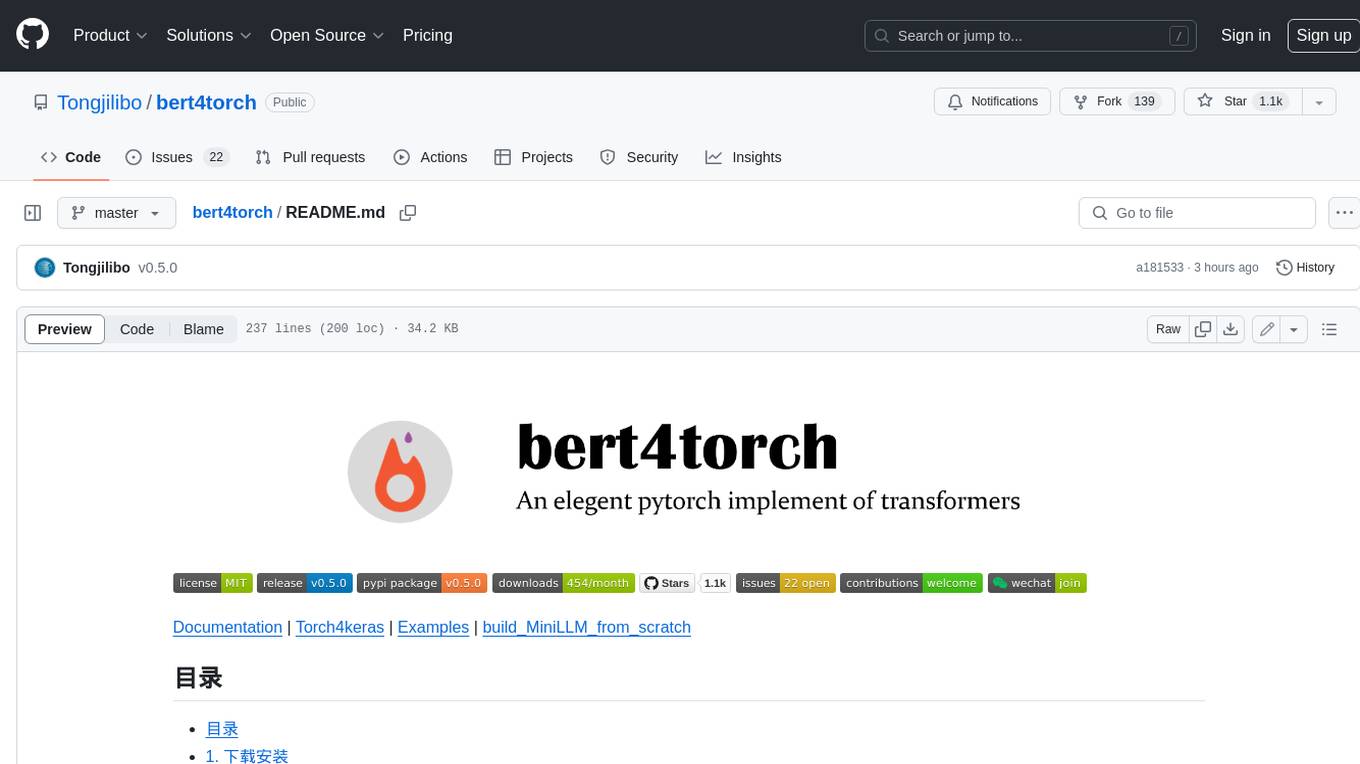
bert4torch
**bert4torch** is a high-level framework for training and deploying transformer models in PyTorch. It provides a simple and efficient API for building, training, and evaluating transformer models, and supports a wide range of pre-trained models, including BERT, RoBERTa, ALBERT, XLNet, and GPT-2. bert4torch also includes a number of useful features, such as data loading, tokenization, and model evaluation. It is a powerful and versatile tool for natural language processing tasks.
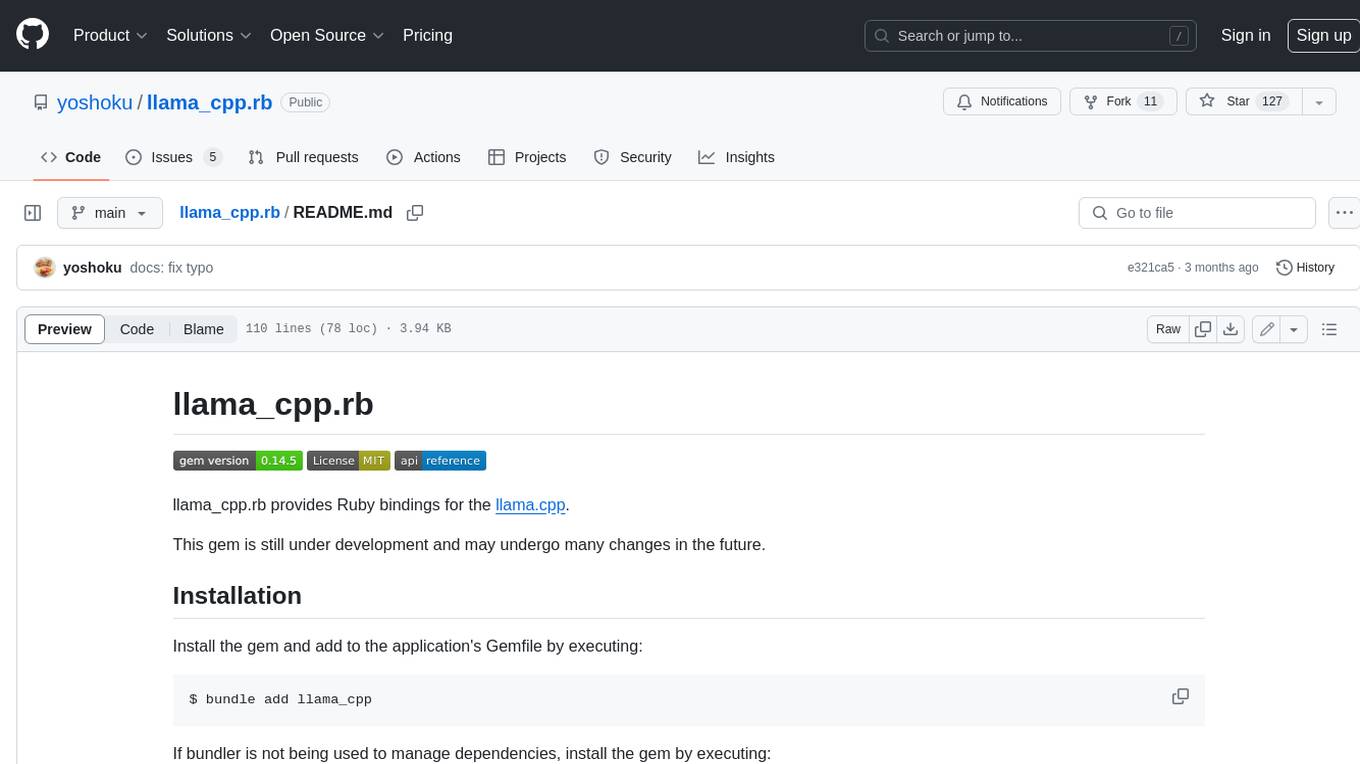
llama_cpp.rb
llama_cpp.rb provides Ruby bindings for the llama.cpp, a library that allows you to use the Llama language model in your Ruby applications. Llama is a large language model that can be used for a variety of natural language processing tasks, such as text generation, translation, and question answering. This gem is still under development and may undergo many changes in the future.
For similar jobs

sweep
Sweep is an AI junior developer that turns bugs and feature requests into code changes. It automatically handles developer experience improvements like adding type hints and improving test coverage.

teams-ai
The Teams AI Library is a software development kit (SDK) that helps developers create bots that can interact with Teams and Microsoft 365 applications. It is built on top of the Bot Framework SDK and simplifies the process of developing bots that interact with Teams' artificial intelligence capabilities. The SDK is available for JavaScript/TypeScript, .NET, and Python.

ai-guide
This guide is dedicated to Large Language Models (LLMs) that you can run on your home computer. It assumes your PC is a lower-end, non-gaming setup.

classifai
Supercharge WordPress Content Workflows and Engagement with Artificial Intelligence. Tap into leading cloud-based services like OpenAI, Microsoft Azure AI, Google Gemini and IBM Watson to augment your WordPress-powered websites. Publish content faster while improving SEO performance and increasing audience engagement. ClassifAI integrates Artificial Intelligence and Machine Learning technologies to lighten your workload and eliminate tedious tasks, giving you more time to create original content that matters.

chatbot-ui
Chatbot UI is an open-source AI chat app that allows users to create and deploy their own AI chatbots. It is easy to use and can be customized to fit any need. Chatbot UI is perfect for businesses, developers, and anyone who wants to create a chatbot.

BricksLLM
BricksLLM is a cloud native AI gateway written in Go. Currently, it provides native support for OpenAI, Anthropic, Azure OpenAI and vLLM. BricksLLM aims to provide enterprise level infrastructure that can power any LLM production use cases. Here are some use cases for BricksLLM: * Set LLM usage limits for users on different pricing tiers * Track LLM usage on a per user and per organization basis * Block or redact requests containing PIIs * Improve LLM reliability with failovers, retries and caching * Distribute API keys with rate limits and cost limits for internal development/production use cases * Distribute API keys with rate limits and cost limits for students

uAgents
uAgents is a Python library developed by Fetch.ai that allows for the creation of autonomous AI agents. These agents can perform various tasks on a schedule or take action on various events. uAgents are easy to create and manage, and they are connected to a fast-growing network of other uAgents. They are also secure, with cryptographically secured messages and wallets.

griptape
Griptape is a modular Python framework for building AI-powered applications that securely connect to your enterprise data and APIs. It offers developers the ability to maintain control and flexibility at every step. Griptape's core components include Structures (Agents, Pipelines, and Workflows), Tasks, Tools, Memory (Conversation Memory, Task Memory, and Meta Memory), Drivers (Prompt and Embedding Drivers, Vector Store Drivers, Image Generation Drivers, Image Query Drivers, SQL Drivers, Web Scraper Drivers, and Conversation Memory Drivers), Engines (Query Engines, Extraction Engines, Summary Engines, Image Generation Engines, and Image Query Engines), and additional components (Rulesets, Loaders, Artifacts, Chunkers, and Tokenizers). Griptape enables developers to create AI-powered applications with ease and efficiency.





